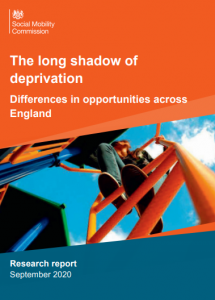Report highlighting the differences in social mobility opportunities within local areas in England.

New research published today (15 Sept) by the Social Mobility Commission (SMC) and carried out by researchers from IFS and the UCL Centre for Education Policy and Equalising Opportunities, is able to show – for the first time – how earnings outcomes of children from different backgrounds vary across lower-tier local authorities.
It explores why there are differences in opportunities across place, considering the important role of education and the labour market in creating pockets of poor social mobility.
The report finds:
- social mobility in England is a postcode lottery, with large differences across areas in both the adult pay of disadvantaged adults, and the size of the pay gap for those from deprived families, relative to those from affluent families
- disadvantaged young adults in areas with high social mobility can earn twice as much as their counterparts in areas where it is low – over £20,000 compared with under £10,000
- pay gaps between deprived and affluent young adults in areas with low social mobility are 2.5 times larger than those in areas with high social mobility
- in areas of low social mobility, up to 33% of the pay gap is driven by family background and local market factors, over and beyond educational achievement
- characteristics of the coldest spots: fewer professional and managerial occupations: fewer outstanding schools: higher levels of deprivation and moderate population density
The report calls on regional leaders to urgently tackle this social mobility post code lottery.
View The long shadow of deprivation: differences in opportunities




